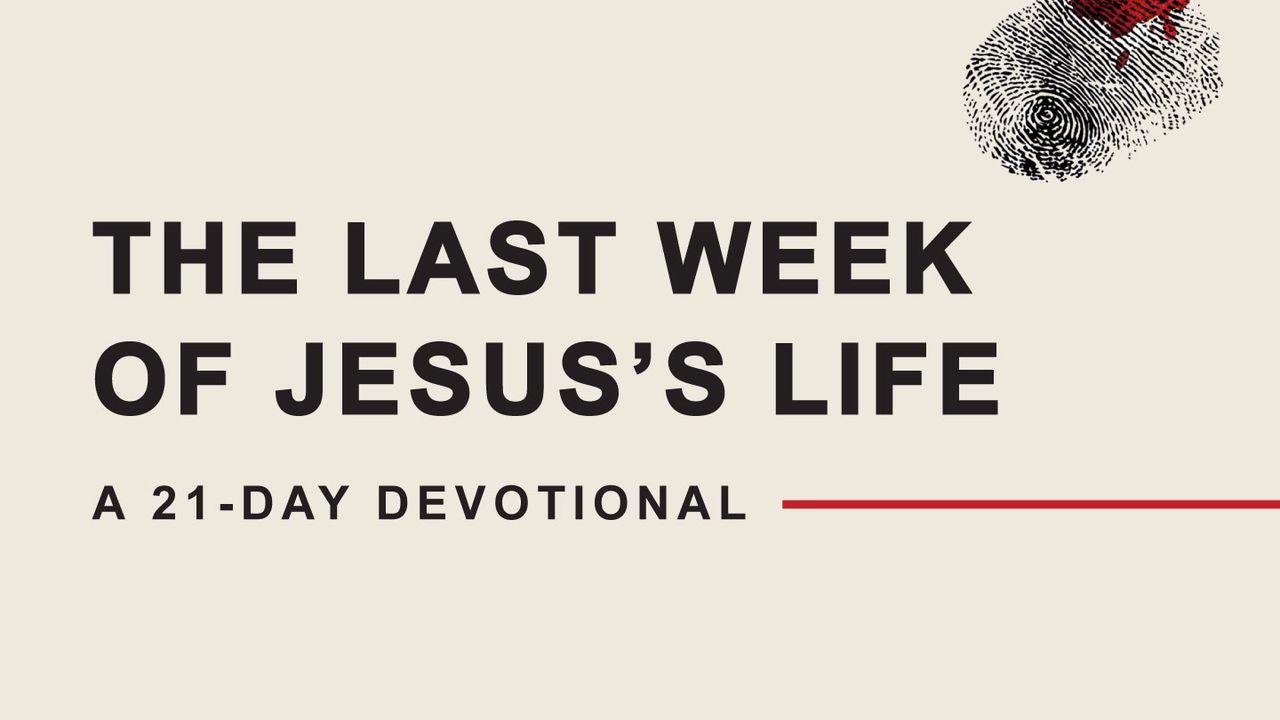The Last Week of Jesus's LifeSample

Tuesday, March 31, 33 AD
Since arriving for the festival, Jesus has staged a mock-military triumphal entry into the city and an act of economic terrorism. What will day three hold?
Jesus returns to Jerusalem in the morning for another day of preaching in the temple courts. He presumably continues to protect the temple from doing any commerce all of Holy Week, encouraging the faithful masses and infuriating the temple aristocracy. The chief priests and their entourage storm up to Jesus, demanding answers: “Tell us by what authority you do these things, or who it is that gave you this authority” (Luke 20:2).
The good rabbi answers with a question: “Tell me, was the baptism of John from heaven or from man?” (v. 4). It’s an excellent question. The masses believe John the Baptizer is a prophet, so if the religionists say “from man,” the people will stone them on the spot. If they say “from heaven,” Jesus can ask why they didn’t believe John. The religionists answer that they don’t know the answer. Jesus replies, “Neither will I tell you by what authority I do these things” (v. 8).
Then, with insane levels of boldness, the Galilean peasant preacher launches into another barely veiled parable (Matthew 21:33–41):
“There was a master of a house who planted a vineyard and put a fence around it and dug a winepress in it and built a tower and leased it to tenants and went into another country. When the season for fruit drew near, he sent his servants to the tenants to get his fruit. And the tenants took his servants and beat one, killed another, and stoned another. Again he sent other servants, more than the first. And they did the same to them. Finally, he sent his son to them, saying, ‘They will respect my son.’ But when the tenants saw the son, they said to themselves, ‘This is the heir. Come, let us kill him and have his inheritance.’ And they took him and threw him out of the vineyard and killed him. When therefore the owner of the vineyard comes, what will he do to those tenants?” They said to him, “He will put those wretches to a miserable death and let out the vineyard to other tenants who will give him the fruits in their seasons.”
Jesus levels his gaze at the religionists (Matthew 21:42–43): “The stone that the builders rejected has become the cornerstone. . . . Therefore I tell you, the kingdom of God will be taken away from you and given to a people producing its fruits.”
No, Jesus is not condemning all Jews and replacing them with all Gentiles. This parable has been used as a justification for persecuting Jews for more than a millennium, but its true meaning is obvious to anyone with ears to hear: The kingdom of God is the vineyard. God is the vineyard’s owner. The tenants are the House of Annas and all religionists before and after. The servants are those martyred doing the will of God (specifically the prophets—Matthew 23:37). The son is Jesus himself. What he’s saying is that the religionists have not only been fruitless in their stewardship of God’s kingdom but they’ve been actively trying to poison it.
The chief priests and their cadre realize Jesus is speaking about them (Matthew 21:45), but they are too afraid to arrest him because the crowds are now convinced that Jesus is a prophet. They have no other option. They must find grounds for an arrest.
Annas sends wave after wave of temple elites to try to get the rabbi to say something worthy of arrest, a sound bite to cancel him, or better yet, crucify him. By whose authority do you teach? Should Jews pay taxes to Caesar? What happens at the resurrection if a woman’s been married to seven brothers in a row? What is the greatest commandment?
Jesus rebuffs each question brilliantly, and eventually, the elites stop asking him questions for fear of a mob reprisal. With no more interruptions from the aristocrats, he mocks their ridiculous outfits and positions and titles (Matthew 23:5–7), then launches a blistering counterattack, pronouncing seven scathing woes on the religionists, calling them blind guides, hypocrites, whitewashed tombs, children of hell, prophet-murderers, and (echoing his kinsman John in Matthew 3:7) serpents and vipers, an expression meaning sons of Satan himself (Matthew 23:13–39).
At the end of the day, the rabbi and his followers head back to Bethany. Back on the Mount of Olives that evening, the disciples are growing desperately impatient. The two sets of brothers (Peter, Andrew, James, and John) ask Jesus when, exactly, everything he’s been saying will come to be.
He tells them to stay tuned, stay alert, and stay awake.
Scripture
About this Plan

In this 21-day plan, Jared Brock, award-winning biographer and author of A God Named Josh, illuminates Jesus’s last days on earth. With depth and insight, Brock weaves archaeology, philosophy, history, and theology to create a portrait of Jesus that you’ve never seen before and draws you closer to Him.
More
We would like to thank Baker Publishing for providing this plan. For more information, please visit: https://bakerbookhouse.com/products/466100
Related Plans

How to Be a Better Husband

21 Days After City Week

Advent

The Incomprehensibility of God's Infinity

Jesus Is Your Healer

Lonely? Overcoming Loneliness - Film + Faith

Man vs. Temptation: A Men's Devotional

TellGate: Mobilizing the Church Through Local Missions

Christmas Morning: Son Rise on a New Day
